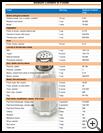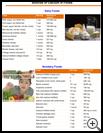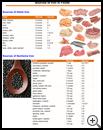
Vitamins and Minerals
________________________________________________________________________
KEY POINTS
- Vitamins and minerals are chemicals that your body cannot make on its own and that are needed in tiny amounts to stay healthy.
- You can get vitamins and minerals from foods and supplements.
- Check with your healthcare provider if you think you may not be getting all the nutrients you need.
________________________________________________________________________
What are vitamins and minerals?
Vitamins and minerals are chemicals that your body cannot make on its own and that are needed in tiny amounts to stay healthy. A healthy diet is the best way to get these nutrients. However, you may not eat enough different foods to get all of the vitamins and minerals that you need. Examples of people who may need to take supplements include:
- Women who may get pregnant should take a folic acid supplement.
- Adults who do not get out in the sun may need a vitamin D supplement.
- Adults age 50 and older may need to eat foods fortified with vitamin B12 or take a supplement that contains vitamin B12.
- People who have osteoporosis may need to take calcium and vitamin D supplements.
- People with age-related macular degeneration may need to take a specific formula of vitamins and minerals to reduce the risk of vision loss.
- People who cannot absorb certain nutrients may need to take specific supplements.
You may want to add a daily multivitamin and mineral supplement to your diet, but supplements are not a substitute for a healthy diet. Check with your healthcare provider, pharmacist, or dietitian before you start taking supplements. This is especially important if you take prescription medicine or are being treated for a health problem.
Choose a supplement that provides no more than 100% of the daily value for you age. Having too much of some supplements can cause serious problems.
Vitamin A
Vitamin A is needed for growth and for strong bones and teeth. As you grow older, it helps keep your skin and eyes healthy. Vitamin A is in liver, fish liver oils, dairy products, dark green and yellow-orange vegetables, and in fruits.
It is rare to get too much vitamin A from foods, but taking supplements with dosages that are too high can cause long-term health problems. Too much vitamin A can be poisonous. It may cause symptoms that include headache, itchy skin, and hair loss.
Vitamin B
Several vitamins are in the B group. They play a part in many of the processes that make the body work properly. They are needed for changing food to energy and keeping your blood, nerves, and skin healthy. Vitamins in the B group are in meats, dairy products, nuts, grains, leafy vegetables, and some fruits.
No poisonous effects have been found for most B vitamins. However, too much vitamin B6 can irritate the nerves.
Vitamin B12 is an important vitamin needed for building red blood cells, and for the health of your nervous system. If you are age 50 or older, if you have pernicious anemia, or if you are a vegetarian, you may not get enough vitamin B12 from the foods you eat. You may need to eat foods fortified with vitamin B12 or take a dietary supplement that contains vitamin B12.
Folic acid
Folic acid is also called vitamin B9. Women who may become pregnant should take a daily folic acid supplement of 400 to 800 micrograms (mcg or ug). Taking folic acid supplements at least 1 month before you get pregnant and then during pregnancy helps protect the baby against problems with the spinal cord. Because not all pregnancies are planned, all women of child-bearing age should take folic acid.
Vitamin C
Vitamin C helps build healthy tissues. It also helps your body heal and may help boost your immune system. It is also an antioxidant, which means it protects against damaging chemical processes in the body. Vitamin C is found in fruits and vegetables such as citrus fruit, cantaloupes, tomatoes, potatoes, and green peppers. Taking high doses of Vitamin C can cause diarrhea.
It can also thin blood too much, especially if you are taking a blood thinning medicine. It can increase the risk for kidney stones.
Vitamin D
Vitamin D builds strong bones and teeth and helps prevent osteoporosis as you grow older. Vitamin D is in fortified dairy products, oily fish, liver, and egg yolk. Sunlight is another source of vitamin D.
Too much vitamin D can cause stomach upset, depression, and calcium deposits in the kidneys and blood vessels.
Vitamin E
Vitamin E is an antioxidant vitamin that helps the cells in your body stay healthy. It also helps the body make new red blood cells. It is in nuts, seeds, plant oils, avocados, grains, and egg yolk.
Too much vitamin E can cause stomach upset and bleeding, especially if you are taking a blood thinning medicine. Too much vitamin E can also keep the body from absorbing vitamins A, D, and K.
Vitamin K
Vitamin K is needed to help blood clot after an injury. It also helps to keep bones healthy and help healing after a broken bone. It is found in leafy green vegetables, broccoli, vegetable oils (especially canola and soybean), egg yolk, pork, and liver. Vitamin K is also made by bacteria that live in the gut.
Large doses of vitamin K can cause allergic reactions in some people, such as itching and rash.
If you take blood-thinning medicine, your healthcare provider will tell you how much vitamin K you should have.
Calcium
Calcium is a mineral needed for strong bones. Milk and dairy products are some of the best sources of calcium. You can also buy calcium fortified juices, cereals, and soy foods. Green vegetables, such as broccoli and kale provide calcium too.
People who get too much calcium have a higher risk for kidney stones, heart attack, and stroke. Men who take calcium supplements are at higher risk for a heart attack. Talk with your healthcare provider about whether you should take a calcium supplement and what amount of calcium is right for you.
Potassium
Potassium helps the body to break down and use carbohydrates. Potassium also helps control the electrical activity of the heart. Meat, fish, dairy products, and many fruits and vegetables provide potassium.
You may need to take a potassium supplement if you take certain kinds of diuretics (water pills), or if you have certain other health problems. However, too much potassium can cause an irregular heartbeat and affect your blood pressure. Talk with your provider about this.
Sodium
Salt in the diet is a mineral called sodium. Sodium helps your body keep the right balance of fluids. The right fluid balance helps your body keep the right blood pressure, keeps you from losing too much fluid (dehydration), and keeps your kidneys healthy. Too much salt in your diet can cause swelling of your hands, feet, and belly, or raise your blood pressure. This puts you at risk for heart disease, especially if you are overweight. Too little or too much sodium in your blood can affect brain, heart, nerve, and muscle cells.
Many people eat more sodium than they need. Many soups, frozen dinners, lunch meats, instant rice and noodle mixes, and other foods have a lot of sodium. Eat more fresh, whole foods, like fresh fruits and vegetables, which have very little sodium. Use little or no salt when you prepare food and do not add salt to food at the table.
Iron
Iron is a mineral that is important to all body cells. Blood cells need iron to bring oxygen to body cells. You can get iron deficiency anemia if you don’t get enough iron. People who have iron deficiency anemia are often tired and may get dizzy or weak. Iron is found in meat, poultry, fish, fruits, vegetables, grains, nuts, legumes, and iron-enriched foods.
If you get enough iron in your diet you don't need a supplement. Taking supplements you don’t need may be harmful. Too much iron in the body can damage your heart and liver.
Zinc
Zinc is an important mineral that helps the body use protein, heal wounds, and have a healthy immune system. Older adults may not get enough zinc from the foods they eat. Foods high in zinc include meats, seafood, dairy products, whole grains, breads and fortified cereals, nuts and dried beans.
Too much zinc can cause nausea, vomiting, loss of appetite, diarrhea, and headaches. It can also affect the way antibiotics and other medicines work.
Fluoride
Fluoride helps prevent tooth decay. Use fluoride toothpaste twice a day. Also ask your dentist if you should use fluoride mouthwash. Too much fluoride can cause irregular white spots on the surface of your teeth.
How do I know if I am eating a healthy diet?
If you feel good, your skin is clear, and you have plenty of energy, you are probably eating a healthy diet. If you are not getting enough vitamins or minerals, you may have symptoms such as:
- Rashes
- A painful, swollen tongue
- Tiredness
- Irritability
- Depression
- Pale skin
- Trouble focusing
Check with your healthcare provider if you think you may not be getting all the nutrients you need.



